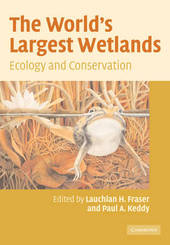
|
The World's Largest Wetlands: Ecology and Conservation
Paperback / softback
Main Details
| Title |
The World's Largest Wetlands: Ecology and Conservation
|
| Authors and Contributors |
Edited by Lauchlan H. Fraser
|
|
Edited by Paul A. Keddy
|
| Physical Properties |
| Format:Paperback / softback | | Pages:500 | | Dimensions(mm): Height 244,Width 170 |
|
| Category/Genre | Ecological science |
|---|
| ISBN/Barcode |
9780521111362
|
| Classifications | Dewey:333.91816 |
|---|
| Audience | | Professional & Vocational | |
|---|
| Illustrations |
18 Halftones, unspecified; 84 Line drawings, unspecified
|
|
Publishing Details |
| Publisher |
Cambridge University Press
|
| Imprint |
Cambridge University Press
|
| Publication Date |
7 May 2009 |
| Publication Country |
United Kingdom
|
Description
During the past century approximately fifty percent of the world's wetlands have been destroyed, largely due to human activities. Increased human population has lead to shrinkage of wetland areas, and data show that as they shrink, their important functions decline. Reduced wetland area causes more flooding in Spring, less available water during drought, greater risk of water pollution, and less food production and reduced carbon storage. Much of the remaining pristine wetland systems are found in the world's largest wetlands, and yet these areas have received surprisingly little scientific research or attention. This volume presents the views of leading experts on each of the world's largest wetland systems. Here, this international team of authors share their understanding of the ecological dynamics of large wetlands and their significance, and emphasise their need of conservation.
Author Biography
Lauchlan H. Fraser was recently appointed the Canada Research Chair in Community and Ecosystem Ecology at the University College of the Cariboo. He has published over twenty-five scholarly papers and is on the editorial boards of Applied Vegetation Science and the Ohio Journal of Science. Dr Fraser's research group examines the processes that organize plant communities and the functional consequences of different emergent patterns on ecosystem functions. His lab focuses on ecosystems that are among those most affected by anthropogenic and natural disturbance, namely freshwater wetlands and temperate grasslands. Professor Paul A. Keddy holds the Edward G. Schlieder Endowed Chair for Environmental Studies. Over his career Keddy has published more than a hundred scholarly papers on plant ecology and wetlands, as well as serving organizations including NSF, NSERC, the World Wildlife Fund and The Nature Conservancy. He has been recognized by the Institute for Scientific Information as a Highly Cited Researcher in the field of Ecology and the Environment. His current research examines the environmental factors that control wetlands, and how these factors can be manipulated to maintain and restore biological diversity.
Reviews'This material should be mainstream reading for ecology and biogeography modules; specialists and generalists will find it illuminating. Well done the editors and contributors!' Biologist
|